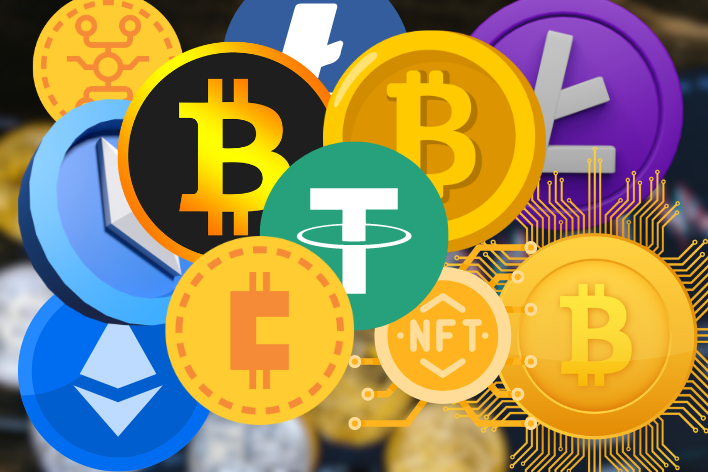Top 10 Trending Cryptocurrencies in August 2024
Top 10 Trending Cryptocurrencies in August 2024
An Insightful Look at This Month's Top Crypto Movers
In the ever-evolving world of cryptocurrency, staying updated on the latest trends is crucial for investors and enthusiasts alike. As we step into August 2024, the crypto landscape is buzzing with new developments and emerging coins that are capturing the attention of the market. In this article, we delve into the top 10 trending cryptocurrencies that are making waves this month. From established market leaders to promising newcomers, discover the coins that are shaping the future of the crypto world and driving innovation in the digital finance space. Whether you’re a seasoned investor or a curious observer, this guide will provide valuable insights into the most influential and talked-about cryptocurrencies of August 2024.
Bitcoin (BTC) - The most established and widely recognized cryptocurrency.
Bitcoin (BTC) remains the cornerstone of the cryptocurrency world, holding its ground as the most established and widely recognized digital asset. Launched in 2009 by the pseudonymous Satoshi Nakamoto, Bitcoin was the first to introduce blockchain technology and decentralized finance to the world. Over the years, it has not only solidified its position as a store of value but has also gained broad acceptance among institutional investors, corporations, and governments. With a robust network of miners, a finite supply capped at 21 million, and an ever-growing ecosystem of applications and services, Bitcoin continues to lead the charge in the cryptocurrency space, setting the standard for innovation and resilience in the digital economy.
Ethereum (ETH) - A leader in smart contracts and decentralized applications.
Ethereum (ETH) has firmly established itself as the premier platform for smart contracts and decentralized applications (dApps), revolutionizing the blockchain landscape since its inception in 2015. Spearheaded by Vitalik Buterin, Ethereum's innovative use of smart contracts has enabled developers to build and deploy a wide range of applications, from decentralized finance (DeFi) platforms to non-fungible tokens (NFTs). The Ethereum network is undergoing significant upgrades, including the transition to Ethereum 2.0, which aims to enhance scalability, security, and sustainability through a proof-of-stake consensus mechanism. As a result, Ethereum remains at the forefront of blockchain innovation, continuously expanding its capabilities and solidifying its role as a foundational layer for the decentralized internet.
Cardano (ADA) - Known for its sustainable proof-of-stake consensus mechanism.
Cardano (ADA) is gaining attention for its eco-friendly approach to cryptocurrency. Unlike many other blockchains that use energy-intensive methods to validate transactions, Cardano uses a proof-of-stake (PoS) system. This means it requires much less energy to operate, making it a more sustainable choice. Created by Charles Hoskinson, Cardano’s PoS system uses an algorithm called Ouroboros, which helps keep the network secure while also being efficient. Cardano also stands out for its careful research and design, aiming to build a strong and long-lasting blockchain. As more people look for greener technology, Cardano’s approach makes it a leader in creating a more sustainable future for cryptocurrencies.
Solana (SOL) - A high-performance blockchain supporting DeFi and dApps.
Solana (SOL) has quickly become a key player in the blockchain space, known for its high-performance capabilities that support decentralized finance (DeFi) and decentralized applications (dApps). Launched in 2020, Solana's blockchain is designed for speed and scalability, boasting impressive transaction speeds and low fees thanks to its unique consensus mechanism, which combines proof-of-history (PoH) with proof-of-stake (PoS). This innovative approach allows Solana to process thousands of transactions per second, making it an attractive platform for developers looking to build and deploy DeFi projects and dApps that require high throughput. With a growing ecosystem and strong developer support, Solana is positioning itself as a leading choice for those seeking efficiency and performance in the blockchain world.
Polkadot (DOT) - Concentrated on facilitating interoperability among diverse blockchains.
Polkadot (DOT) is leading the charge in blockchain interoperability, a crucial feature for the next generation of decentralized technologies. Developed by Dr. Gavin Wood, Polkadot's design enables various blockchains to interact and exchange information seamlessly. Its architecture includes a central relay chain that coordinates multiple parachains, or individual blockchains, allowing them to share data and assets while maintaining their own unique protocols. This connectivity not only enhances the functionality of each blockchain but also reduces fragmentation within the ecosystem. Polkadot's focus on interoperability is paving the way for a more integrated and efficient blockchain environment, making it a pivotal player in building a cohesive and versatile digital landscape.
Avalanche (AVAX) - Provides fast and secure transactions for decentralized applications.
Avalanche (AVAX) is making waves in the blockchain space with its promise of fast and secure transactions tailored for decentralized applications (dApps). Launched by Emin Gün Sirer, Avalanche boasts a highly scalable and efficient consensus protocol that enables rapid transaction processing with minimal fees. Its unique architecture features three interoperable blockchains—X-Chain, C-Chain, and P-Chain—that work together to deliver high throughput and low latency. This design ensures that developers can build and deploy dApps that operate smoothly and cost-effectively. With its focus on speed, security, and scalability, Avalanche is positioning itself as a top choice for projects seeking robust performance and reliability in the decentralized finance (DeFi) space and beyond.
Chainlink (LINK) - Essential for integrating real-world data with blockchain applications.
Chainlink (LINK) is a pivotal technology in the blockchain ecosystem, specializing in bridging the gap between real-world data and blockchain applications. Founded by Sergey Nazarov, Chainlink provides a decentralized oracle network that allows smart contracts to access off-chain data, such as market prices, weather conditions, and other external information. This capability is crucial for enabling the execution of complex, data-driven smart contracts across various sectors, including decentralized finance (DeFi), insurance, and supply chain management. By securely and reliably integrating real-world data with blockchain applications, Chainlink enhances the functionality and versatility of smart contracts, making it an essential component for the future of decentralized technologies.
Polygon (MATIC) - Enhances Ethereum by offering faster and cheaper transactions.
Polygon (MATIC) has emerged as a key player in optimizing the Ethereum network by offering faster and more cost-effective transactions. Originally known as Matic Network, Polygon provides a Layer 2 scaling solution that enhances Ethereum's capabilities through its sidechains and rollups. These technologies reduce congestion and transaction fees on the main Ethereum chain, enabling smoother and more affordable interactions for users and developers. Polygon’s approach helps to address Ethereum's scalability issues while maintaining high security and compatibility with existing Ethereum-based applications. By bridging the gap between Ethereum’s high demand and its performance limitations, Polygon is making decentralized finance (DeFi) and other blockchain applications more accessible and efficient.
Cosmos (ATOM) - Promotes interoperability and scalability among blockchains.
Cosmos (ATOM) is at the forefront of promoting interoperability and scalability in the blockchain ecosystem. Launched with the vision of creating an "Internet of Blockchains," Cosmos enables diverse blockchain networks to interoperate and communicate seamlessly through its Inter-Blockchain Communication (IBC) protocol. Its unique architecture features the Cosmos Hub, which connects various independent blockchains, known as zones, allowing them to share information and assets securely and efficiently. This approach not only enhances the scalability of individual blockchains but also fosters a more interconnected and collaborative blockchain environment. By addressing the challenges of blockchain fragmentation and scalability, Cosmos is paving the way for a more integrated and versatile digital future.
Near Protocol (NEAR) - Known for its user-friendly platform and fast transaction speeds.
Near Protocol (NEAR) is gaining recognition for its user-friendly design and impressive transaction speeds, making it a popular choice among developers and users alike. Launched with the aim of simplifying blockchain technology, Near Protocol offers an intuitive platform that lowers the barrier to entry for new users and developers. Its innovative sharding technique, known as Nightshade, allows the network to process transactions rapidly and efficiently, supporting high throughput and low latency. This combination of user-centric design and technical excellence positions Near Protocol as a leading blockchain platform for building decentralized applications (dApps) and scaling solutions, enhancing both accessibility and performance in the blockchain space.
Conclusion:
The top 10 trending Cryptocurrencies in August 2024 reflect the dynamic and rapidly evolving nature of the blockchain industry. From established giants like Bitcoin and Ethereum, which continue to innovate and lead the market, to emerging players like Solana and Avalanche, which are pushing the boundaries of speed and scalability, each cryptocurrency brings unique strengths and advancements to the table. Polkadot and Cosmos stand out for their focus on interoperability, while Cardano and Near Protocol emphasize sustainability and user-friendly experiences. Chainlink's crucial role in integrating real-world data with blockchain applications and Polygon's enhancement of Ethereum's efficiency underscore the diverse and innovative solutions driving the crypto space forward. As these cryptocurrencies continue to evolve and adapt, they shape the future of decentralized finance, applications, and digital interactions, offering exciting possibilities for investors, developers, and users worldwide.





